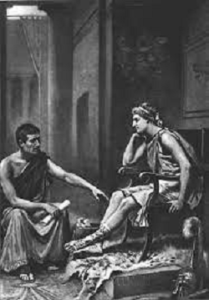
Modern sophistry
In addition to the crisis of thought, the social crisis that we have not been able to resolve in more than a century of a spectacular development of forces and technologies that interfere with nature and should help man and not destroy nature, perhaps the most common civilizational crisis is in politics, I use it perhaps because the thought that underpins it has been lost.
crisis that we have not been able to resolve in more than a century of a spectacular development of forces and technologies that interfere with nature and should help man and not destroy nature, perhaps the most common civilizational crisis is in politics, I use it perhaps because the thought that underpins it has been lost.
The model of modern society began in ancient Greece and Plato refers to this model mainly in his work “The Republic”, however the initial clash is against what was used as a form of power in his time: sophistic thought.
It is necessary to define the sophist so that he is not confused with the philosopher or the politician, Plato starts from the assumption that no man is given the power to know all things, which would make him a god, and in the false propaganda of the Sophist, he could only teach an appearance of universal science, and here he finds the difficulty of establishing what is the falsehood and the truth of a deceptive speech, as is present in any speech.
This difficulty between truth and falsehood is one that encourages an ontological discussion, thus establishing an art of illusion, it is necessary to investigate what are the parameters that delimit it and what provides this power of illusion, in addition to determining which its object and its relationship with what is imitated, so the sophist is not a layman, he does have an art that must be justified as illusory and harmful when one intends to formulate a critique and establish the ideal principle or norm to educate oneself.
This is the modern sophistry, what it is to educate, now it is not just about Piaget, Skinner, Constructivist, Vygotsky or any of the “modern” learning theories, but rather the problem of fragmentation and vulgarization of knowledge, where even Basic questions in mathematics, geography or literature, for example, are completely ignored in teaching.
Two modern sophisms, just to give an example, of apparently logical arguments that lead to mistaken conclusions: “Those who don’t work have a lot of free time”, the idea of using the power of the knowledge of the crowd led many people to invest “idle time” in social media activities, virtual games that are slot machines, etc., another spiritual one is one that imagines a God or an energy that creates fortunes and automatically resolves complex things in life, the logic is “If God is love and I love God, my life is resolved”, effort, dedication and personal work must come together with this attitude and this means having attitudes compatible with a dignified religious life: honesty, fraternity with those who depend on us and resilience in times of difficulty , which are normal in life.
When Plato created the Republic, he did not forget the virtues of the public man and all philosophy worked in this direction, but the mistakes in thought (philosophy) and in society (or politics) are due to the development of ancient thought in an always true direction, despite logic, because instrumentalized logic can be sophistry.









